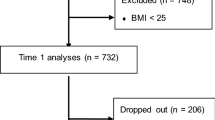Abstract
Excessive fluid intake in hemodialysis patients can lead to serious cardiovascular complications. However, previous studies have not investigated factors that affect fluid adherence over time. The influence of three sets of factors—attributions, health beliefs, and negative emotions—was examined to determine their influence on changes in fluid adherence over time. We assessed patient's fluid-intake changes across two time periods, as well as their absolute level. The results indicated that attributions, while predicting absolute fluid adherence, did not predict changes in fluid adherence. On the other hand, health beliefs predicted changes in fluid adherence but not absolute levels. Negative emotions predicted neither absolute nor changes in fluid adherence. It is suggested that attributions are more responsible for maintenance and control of stable fluid adherence levels, while health beliefs are more responsible for motivational factors related to changes in fluid adherence over time.
Similar content being viewed by others
References
Schneider MS, Friend R, Whitaker P, Wadhwa NK: Fluid noncompliance and symptomatology in end-stage renal disease: Cognitive and emotional variables.Health Psychology. 1991,10: 209–215.
Rosenbaum M, Ben-Ari Smira KB: Cognitive and personality factors in the delay of gratification of hemodialysis patients.Journal of Personality and Social Psychology. 1986,51: 357–364.
Lamping DL, Campbell KA, Churchill DN: Does hemodialysis compliance show consistency and stability? The 22nd Annual Meeting of the Association for the Advancement of Behavior Therapy. New York: 1988.
Christensen AJ, Smith TW, Turner CW, et al: Family support, physical impairment, and adherence in hemodialysis: An investigation of main and buffering effects.Journal of Behavioral Medicine. 1991,15: 313–325.
Thorndike RL: Reliability. In Jackson DN, Messick S (eds),Problems in Human Assessment. New York: McGraw-Hill, 1967, 217–240.
Lewin K: Group decision and social change. In Maccoby EE, Newcomb TM, Hartley EL (eds),Readings in Social Psychology. New York: Holt, 1947, 197–211.
Eitel P, Hatchett L, Friend R, Griffin KW, Wadhwa NK: Burden of self-care in seriously ill patients: Impact on adjustment.Health Psychology. 1995,14: 457–463.
Wiebe JS, Christensen AJ: Patient adherence in chronic illness: Personality and coping in context.Journal of Personality. 1996,64: 815–835.
Prochaska JO, DiClemente CC: Stages and processes of self-change of smoking: Toward an integrative model of change.Journal of Consulting and Clinical Psychology. 1983,51: 390–395.
Beck CD, Ward CH, Mendelson M, Mock J, Erbaugh J: An inventory for measuring depression.Archives for General Psychiatry. 1961,4: 53–64.
Spielberger CD, Gorsuch RC, Lushene RE:Manual for the State-Trait Anxiety Inventory. Palo Alto, CA: Consulting Psychologist Press, 1970.
Siegal JM: The Multidimensional Anger Inventory.Journal of Personality and Social Psychology. 1986,51: 191–200.
Beck AT, Steer RA, Garbin MG: Psychometric properties of Beck Depression Inventory: Twenty-five years of evaluation.Clinical Psychology Review. 1988,8: 77–100.
Newmark CS: Stability of state and trait anxiety.Psychological Reports. 1972,30: 196–198.
Wolcott DW, Maida CA, Diamond R, Nissenson AR: Treatment compliance in end-stage renal disease patients on dialysis.American Journal of Nephrology. 1986,6: 329–338.
Schneider MS:Treatment of Fluid Abusive Hemodialysis Patients: An Evaluation of the Relapse Prevention Model. Unpublished Dissertation, State University of New York at Stony Brook, 1991.
Binik YM, Devins GM, Ormes CM: Psychology stress and coping in end-stage renal disease. In Newfeld RWJ (ed),Advances in the Investigation of Psychological Stress. New York: Wiley, 1989, 305–342.
Symister P, Friend R, Wadhwa NK, Suh H: Psychological adjustment to compliance, depression, and staff social support: Their relationship to objective compliance in ESRD patients. The 17th Annual Conference on Peritoneal Dialysis. Denver, CO: 1997.
Wadhwa NK, Friend R, Gaus V, Taylor KL, Schneider MS: Weight reduction and fluid intake in an obese and fluid noncompliant ESRD patient.Clinical Nephrology. 1996,45: 320–324.
Author information
Authors and Affiliations
Additional information
We thank Marci Lobel, Alan Christensen, and reviewers for their thoughtful comments and Paul Whitaker for his help in this project.
About this article
Cite this article
Friend, R., Hatchett, L., Schneider, M.S. et al. A comparison of attributions, health beliefs, and negative emotions as predictors of fluid adherence in renal dialysis patients: A prospective analysis. ann. behav. med. 19, 344–347 (1997). https://doi.org/10.1007/BF02895152
Issue Date:
DOI: https://doi.org/10.1007/BF02895152




